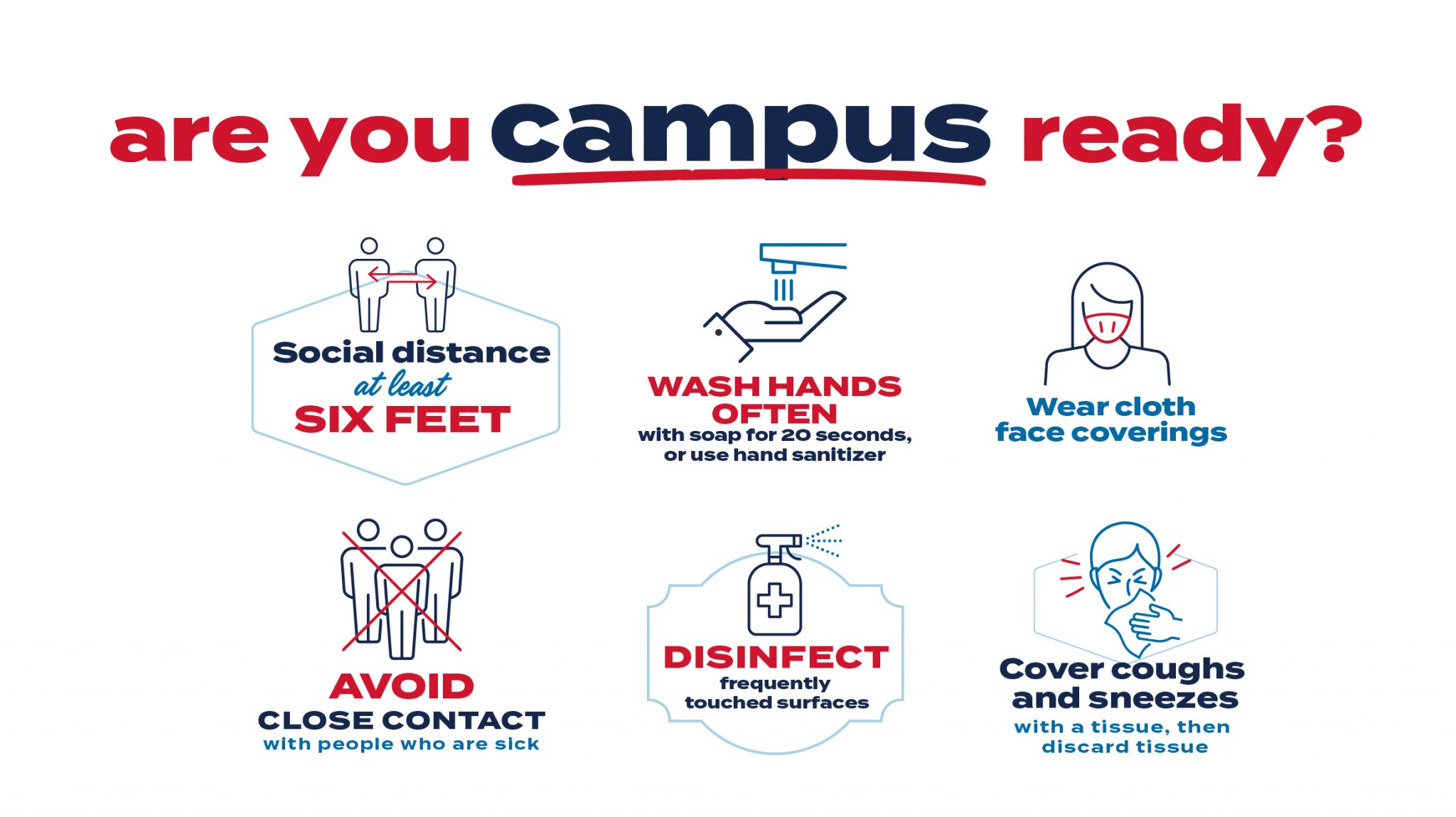
The University of Mississippi is implementing new protocols and expectations for everyone on campus, a modified academic calendar, new forms of course delivery, mandatory training for employees and students, daily symptom checks, and COVID-19 testing and tracing.
OXFORD, Miss. – The University of Mississippi has released its official “Campus Ready” plan that outlines campus operations and modified academic parameters in preparation for faculty, staff, and students to return to campus for the fall 2020 semester.
To help prevent the spread of COVID-19 while returning to in-person operations, the university is implementing new protocols and expectations for everyone on campus, a modified academic calendar, forms of in-person and remote course delivery, mandatory training for employees and students, daily symptom checks and COVID-19 testing and tracing.
“The best way to prevent illness is to avoid being exposed to this virus,” Chancellor Glenn F. Boyce said in a letter to the campus community. “To that end, we have redesigned fundamental aspects of campus life in an effort to mitigate the risk of virus spread and help us all keep each other healthy.
“I know we’re all eager to return and regain our sense of community and connections to one another. Fall will be here before we know it, and it will require all of us working collectively and in alignment to limit the spread of the virus and bring people back to our beautiful campus.”
Boyce shared the university’s guiding principles in shaping the “Campus Ready” plan: preventing the spread of the virus and safeguarding the community; resuming on-campus learning while prioritizing safety and well-being; fulfilling the university’s core mission of education, research and service; and enabling students to maintain academic progress toward their degrees.
He also emphasized the important role of compliance by all members of the university community with the parameters and protocols, including maintaining 6 feet of physical distancing and practicing proper hand hygiene. Face masks or cloth face coverings will be required to be worn properly – over the nose and mouth – at most times by faculty, staff, students and visitors, including all times while indoors and in the presence of anyone else, and while outdoors where maintaining 6 feet of spacing is not possible.
Another area outlined in the plan is testing and tracing. Any student, faculty or staff member who develops symptoms of COVID-19 or has been exposed to someone suspected of or confirmed to have COVID-19 is expected to notify University Health Services or their medical provider immediately.
University Health Services will provide testing and ask anyone who has been tested to quarantine until they receive their results. All positive tests must be reported to UHS, which will communicate with the Mississippi State Department of Health and the appropriate campus departments to conduct contact tracing.

The university continues to evaluate classrooms and seating capacity. This seating chart represents a sample classroom with physical distancing.
Common spaces will be cleaned throughout the day by Facilities Management custodial staff, but disinfectants, hand sanitizer and other supplies will be widely available in all facilities. Students and faculty will be expected to help maintain sanitary surfaces and common areas.
In his letter to the university community, Boyce said all members of the Ole Miss community will be responsible for protecting those individuals on campus with underlying conditions that make them more vulnerable to COVID-19. Each community member is expected to fully commit to protecting the community’s collective health and well-being.
“While we remain focused on preserving the on-campus experience, COVID-19 has forced us to rethink everything we do,” Boyce said.
Other items outlined in the “Campus Ready” plan include:
Modified Academic Calendar
The fall 2020 semester will begin as scheduled Aug. 24, with the last day of classes being held Nov. 17, the week before Thanksgiving. Final exams will be administered Nov. 18, a Wednesday, through the following Tuesday.
The semester was shortened to mitigate the potential spread of the virus, account for other health threats during the winter and acknowledge the likelihood of increased travel during the late fall holidays.
Course Delivery
Classroom capacities will be reduced to comply with CDC and national public health recommendations. This will necessitate some courses to be conducted in person or a blend of in-person and online, while others will be offered through remote or fully online delivery. The decision on how to offer each course will be made by deans, chairs and faculty.
The university anticipates that all course delivery information will be updated around July 20.
Mandatory Training
Before returning to campus, all employees and students will be required to complete an online training module related to COVID-19 protocols.
Daily Symptom Checker
Students and employees will be required to complete a brief COVID-19 Daily Symptom Checker before going to campus each day. The checker will simply guide students and employees through a series of questions to ensure everyone is as aware of their COVID-19 risk.
Noel Wilkin, provost and executive vice chancellor for academic affairs, chairs the Future Planning Task Force, charged with developing the “Campus Ready” plan. Wilkin explained that the symptom checker assists community members in self-monitoring for COVID-19 symptoms and directs them to health professionals as needed.
“The purpose of the self-checker is to help people make decisions about seeking appropriate medical care,” he said. “It has already led to employees being tested, opened the door to educational opportunities between employees and our health experts, and contributes to our community’s health and safety. And we are able to accomplish all this while respecting people’s privacy.”
The “Campus Ready” plan was developed in alignment with government orders and public health recommendations from the Safe Return order of Gov. Tate Reeves’s reopening plan, the city of Oxford’s Serving Oxford Safely recovery plan, the IHL Safe Start Task Force, the U.S. Centers for Disease Control and Prevention, the Mississippi State Department of Health, and the American College Health Association.
“Campus Ready” also includes specific guidance about events, student housing and fall 2020 move-in, dining services, fraternity and sorority life, the Student Union, Student Disability Services, financial aid, campus transportation and more. Additionally, the university has updated its FAQs and provided a highlight document of the plan.
“If we cannot achieve full compliance with the protocols across our entire community and the university experiences prolific spread of the virus, we will have no choice but to scale back on-campus operations and take more drastic measures to prevent further spread,” Boyce said.
“If we all do our part to prevent the virus from spreading using the protocols, our level of activity on campus in the fall can be greater.”